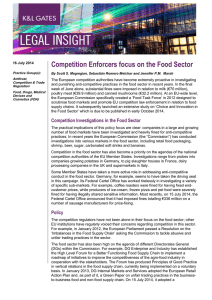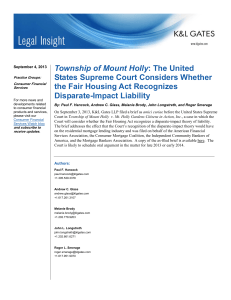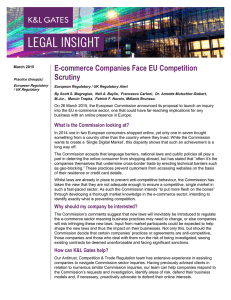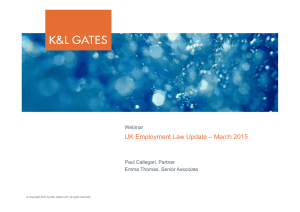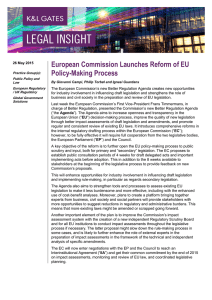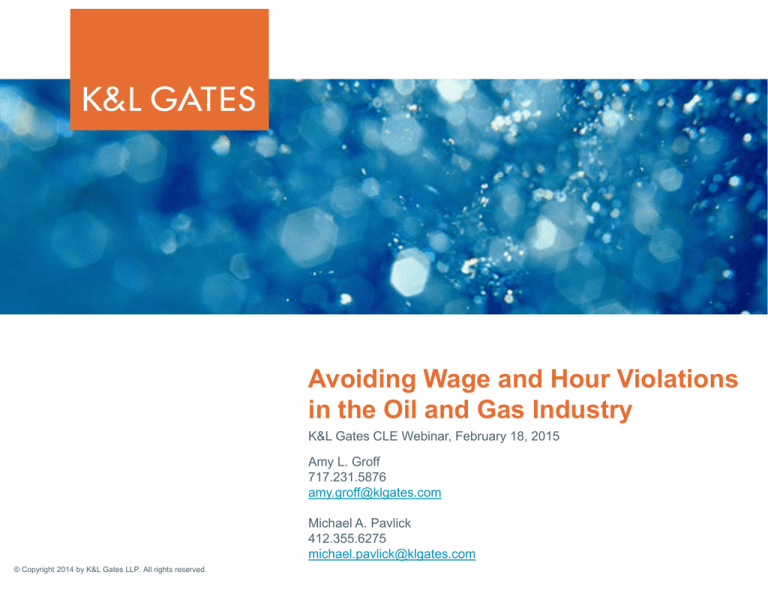
Avoiding Wage and Hour Violations
in the Oil and Gas Industry
K&L Gates CLE Webinar, February 18, 2015
Amy L. Groff
717.231.5876
amy.groff@klgates.com
Michael A. Pavlick
412.355.6275
michael.pavlick@klgates.com
© Copyright 2014 by K&L Gates LLP. All rights reserved.
DEPARTMENT OF LABOR FINDINGS
MARCELLUS SHALE “SWEEP”
Targeted enforcement initiative started in 2012
Oil and gas industry – at all levels
DOL collected $4.5M for 5,300 workers in PA and
WV
klgates.com
2
DEPARTMENT OF LABOR FINDINGS
MARCELLUS SHALE “SWEEP”
Ongoing – expanded to other parts of the country
Most common violations:
Improper calculation of OT pay (e.g., production
bonuses not included in regular rate for OT
purposes)
Salaried employees misclassified as exempt from OT
klgates.com
3
CONTRACTOR OR EMPLOYEE
FLSA only applies to employees.
Employee: “any individual employed by an
employer.” 29 USC s.203(e)(1).
Employer: “any person acting directly or indirectly in
the interest of an employer in relation to an
employee . . . .” 29 USC s.203(d).
Employ: “to suffer or permit to work.” 29 USC
s.203(g).
klgates.com
4
A “SUPER” DEFINITION
“[O]f all the acts of social legislation, the Fair Labor
Standards Act has the broadest definition of
‘employee.’” Donovan v. DialAmerica, 757 F.2d
1376 (3d Cir. 1985).
The FLSA has “the broadest definition [of employee]
. . . ever included in any one act.” United States v.
Rosenwasser, 323 U.S. 360 (1945) (quoting from
Sen. Hugo Black).
klgates.com
5
ECONOMIC REALITY
The degree of company’s right to control manner in
which work is performed.
The worker’s opportunity for profit or loss based on
skill.
The worker’s investment in equipment or materials or
employment of helpers.
Whether the service rendered requires special skill.
The degree of permanence of the working relationship.
Whether service is integral part of the company’s
business.
klgates.com
6
ECONOMIC REALITY
As a matter of economic reality is the worker
dependent upon the business to which they render
service?
The six factors are the means to that end. In other
words, they help to inform the decision on the
ultimate question of economic reality.
“Economic reality” “encompasses millions of facts.”
Reyes v. Remington, 495 F.3d 403 (7th Cir. 2007).
klgates.com
7
ECONOMIC REALITY
“A score of 5-3 decides a baseball game, but this
regulation does not work that way.” Reyes.
The economic realities test “does nothing more than
provide a frame of reference . . . . It offers a way to
think about the subject and not an algorithm. That’s
why toting up a score is not enough.” Reyes.
klgates.com
8
BEYOND ECONOMIC REALITY
Murray v. Principal Financial Group (9th Cir. 2010)
“[T]here is no functional difference between the three
formulations.”
12 factors identified:
Skill required
Source of instrumentalities/tools
Location of work
Duration of relationship
Can hiring party assign additional projects
Hired party’s discretion over when and how long to work
Method of payment
Hired party’s role in hiring and paying assistants
Work part of regular business of hiring party
Hiring party is in business/can work elsewhere
Provision of employee benefits
Tax treatment of the hired party
klgates.com
9
OVERTIME
Workweek standard; cannot average two weeks of a
bi-weekly payroll
OT pay must be based on “regular rate”
Key - accurately determining the regular rate
Regular rate often is not equivalent to standard
hourly rate of pay.
Total straight time compensation / Total hours
Includes certain bonuses and other payments
klgates.com
10
OVERTIME
REGULAR RATE
Payments not expressly excluded from the regular
rate should be included.
Examples of payments included in the regular rate:
Wages (hourly, day rate, fee/task basis, etc.)
Bonuses that depend on hours worked
Bonus and incentive payments based on quality,
quantity or efficiency
klgates.com
11
OVERTIME
REGULAR RATE
Value of awards and prizes won by employees for
quality, quantity or efficiency in performance of usual
work activities during regular work hours
Commission payments
Payments for meals, lodging and facilities
Shift differentials, hazard pay, dirty work pay
klgates.com
12
OVERTIME
REGULAR RATE EXCLUSIONS
The following are payments that may be excluded
from the regular rate:
Discretionary bonuses*
Employee referral bonuses
Suggestion plan awards
Percentage bonuses (paid as percentage of total wages,
including overtime wages)
Certain employee benefit plan contributions
klgates.com
13
OVERTIME
REGULAR RATE EXCLUSIONS (CONT’D)
Gifts
Paid leave from work
Reimbursement of expenses
Severance pay
Premium pay, at a rate of at least time and one-half, for
work on weekends, holidays, 6th or 7th day of the week,
and (pursuant to contract) work outside of regular work
hours
klgates.com
14
OVERTIME
BONUSES
Discretionary bonuses may be excluded from total
compensation when calculating the regular rate.
klgates.com
15
OVERTIME
BONUSES
“Discretionary” if both (i) the fact that the payment is to
be made and (ii) the amount of the payment are
determined at the sole discretion of the employer at or
near the end of a period and not pursuant to any
contract, agreement, or promise causing the employee
to expect such payments regularly
klgates.com
16
OVERTIME
BONUSES
NOT discretionary if bonus is announced to
employees to induce them to work more efficiently
or remain with the company
E.g., bonuses based on individual or group
production, performance, quality of work, or an
employee’s remaining with the company until the
time of payment would not qualify as discretionary
klgates.com
17
OVERTIME
CALCULATION OF REGULAR RATE
Example #1
Base pay is $10/hour [or $100 per day]
50 hours worked [5 days]
Straight time pay = $500
Regular rate = $500 divided by 50 hours = $10/hour
Additional OT premium due = 10 OT hours x additional half
time ($5/hour) = $50
Total compensation for week: $550
klgates.com
18
OVERTIME
CALCULATION OF REGULAR RATE
Example #2
Base pay is $10/hour, worked 50 hours
Also paid a $100 bonus
Straight time pay = $600 (50 hours x $10 + $100)
Regular rate = $12/hour ($600 divided by 50 hours)
Additional OT premium due = $60 (10 OT hours x $6/hour)
Total compensation for week: $660
klgates.com
19
SALARIED, EXEMPT EMPLOYEES
(THE “WHITE-COLLAR” EXEMPTIONS)
Certain employees may be exempt from FLSA
White Collar Exemption: executive, administrative,
and professional workers
Typically must satisfy a minimum compensation
requirement and both a duties test and a salary
basis test
klgates.com
20
SALARIED, EXEMPT EMPLOYEES
EXECUTIVE EXEMPTION
Must be paid $455 per week on a salary basis
Primary duty must be management
What is a primary duty?
What is management?
Must customarily and regularly direct 2 or more
other workers
Must have the authority to hire or fire other
employees, or make suggestions on employee
status that are given particular weight
klgates.com
21
SALARIED, EXEMPT EMPLOYEES
ADMINISTRATIVE EXEMPTION
Must be paid $455 per week on a salary basis
Primary duty must be non-manual work directly
related to the management or general business
operations of the employer or the employer’s
customers
Must exercise discretion and independent judgment
with respect to matters of significance
An employee who leads a team of other employees
assigned to a major project generally meets this
requirement
klgates.com
22
SALARIED, EXEMPT EMPLOYEES
PROFESSIONAL EXEMPTION
Usually must be paid $455 per week on a salary
basis
Must be a learned professional, artistic professional,
teacher, doctor, or attorney
Learned professionals do work requiring advanced
knowledge in a field of science or learning
customarily acquired through prolonged instruction
and must consistently exercise discretion and
judgment
klgates.com
23
SALARIED, EXEMPT EMPLOYEES
MINIMUM COMPENSATION REQUIREMENT
Must be paid a minimum of $455 per week ($23,660
per year) on a salary basis
The minimum may not be prorated for part-time
workers
Workers who are paid $100,000 or more per year in
total compensation and who perform any one or
more exempt duties can qualify for the highly
compensated employee exemption
klgates.com
24
SALARIED, EXEMPT EMPLOYEES
THE SALARY BASIS TEST
Must be paid full salary for any work week during
which employee works
Need not be paid salary if employee performed no
work during a work week
Common issues – tracking time, reducing salary,
using accrued leave time, paying extra
compensation, and correcting improper deductions
klgates.com
25
SALARIED, EXEMPT EMPLOYEES
REDUCING SALARY
General rule – a salaried exempt employee is
entitled to his or her full salary in any week
during which he or she performs any work
klgates.com
26
SALARIED, EXEMPT EMPLOYEES
REDUCING SALARY
An exempt worker’s salary may be reduced when:
The worker is absent due to sickness or disability lasting
one day or longer and the employer maintains a bona
fide plan, policy, or practice of providing compensation
for loss of salary occasioned by sickness or disability
The worker is subject to an unpaid disciplinary
suspension of one or more full days imposed in good
faith for infractions of workplace conduct rules
The employer reduces a worker’s salary to offset
amounts received for jury duty, witness fees, or
temporary military service
klgates.com
27
SALARIED, EXEMPT EMPLOYEES
REDUCING SALARY
An exempt worker’s salary may not be reduced
when:
The employer does not provide work
The worker misses work for civic responsibilities
The worker is absent for a partial day
klgates.com
28
SALARIED, EXEMPT EMPLOYEES
USING ACCRUED LEAVE TIME
Federal law draws a distinction between salary and
leave banks
Federal law thus allows incremental or hourly use
of accrued leave time
Critical question – what happens when leave is
exhausted?
klgates.com
29
SALARIED, EXEMPT EMPLOYEES
CORRECTING IMPROPER DEDUCTIONS
The federal regulations establish a “window of
correction” that provides two avenues for employers
to avoid the loss of exempt status
First, if improper deductions are isolated or
inadvertent and the employer reimburses the
employee for any improper deductions
Second, if the employer has a policy prohibiting
improper deductions (including a complaint
procedure), reimburses the employee, agrees to
comply in the future, and has acted in good faith
klgates.com
30
RECORDKEEPING REQUIREMENTS
RECORDKEEPING (FLSA)
Basic payroll recordkeeping requirements
Name in full (Ee ID #, if applicable)
Home address
Date of birth
Sex and occupation
Workweek
Regular rate
Wage basis
Hours worked (total each workday and
workweek)*
Straight time earnings
OT pay
Deductions from and additions to
wages
Allowances claimed as part of
minimum wage
Pay period covered
Wages paid and date paid
Retroactive payments
* Note – not required to record hours worked
by salaried, exempt employees
klgates.com
31
RECORDKEEPING REQUIREMENTS
PRESERVATION OF RECORDS
Three-Year Retention Required:
Payroll and other records containing information required
by recordkeeping regulations
Sales and purchase records relevant to determining
whether an enterprise meets FLSA’s “business volume”
test
Collective bargaining agreements that set terms under
which facilities are provided to employees
klgates.com
32
RECORDKEEPING REQUIREMENTS
PRESERVATION OF RECORDS
Three-Year Retention (cont’d)
Plans, trusts, employment contracts and union contracts
involving exclusions from regular pay rates
Contracts and memoranda relating to “Belo” contracts
that guarantee fixed weekly pay for fluctuating hours
Agreements basing overtime pay on piecework, hourly or
basic rates
Certificates and notices mentioned in recordkeeping
regulations
klgates.com
33
RECORDKEEPING REQUIREMENTS
PRESERVATION OF RECORDS
Two-Year Retention Required
Work Schedules
Wage Rate Tables
Order, Shipping and Billing Records
klgates.com
34
RECORDKEEPING REQUIREMENTS
POSTINGS
See written materials for list of posting requirements
under various federal employment laws.
For employers with Spanish-speaking employees or
employees who speak another language, many
posters can (and should) also be obtained in
Spanish and other languages.
klgates.com
35
RECORDKEEPING REQUIREMENTS
EMPLOYMENT ELIGIBILITY VERIFICATION
FORM (I-9)
Maintain for the later of:
3 years after the employee is hired, or
1 year after the employee is terminated
Employers may sign and store I-9s electronically
klgates.com
36
WAGE AND HOUR AUDIT PROCESS
FEDERAL AUDITS – FLSA
Background
U.S. DOL Wage & Hour Division
Section 11 Authority
Investigations Initiated by Complaint or Randomly
Selected
Enforcement Initiatives
klgates.com
37
WAGE AND HOUR AUDIT PROCESS
FLSA
Overview of Investigation
Scheduled vs. unannounced visit
Initial conference
Record review
Employee interviews
Final conference
klgates.com
38
WAGE AND HOUR AUDIT PROCESS
FLSA
Payment of Back Wages
Calculation of Back Wages
Supervision of Payment by DOL
(Note: DOL can collect back wages even if affected
employee cannot be located.)
Section 16(b) Letter
“Bridge to Justice” – ABA
DOL will give employee an estimate of the back wages due
and toll-free number for an American Bar Association
attorney referral service
klgates.com
39
WAGE AND HOUR AUDIT PROCESS
FLSA
Civil Penalties
Assessed for repeat or willful violations of MW or OT
requirements
Assessed for violation of child labor standards
Assessment letter
Appeals
klgates.com
40
WAGE AND HOUR AUDIT PROCESS
FLSA
Court Proceedings
Suit can be initiated by DOL or employee(s)
Not required to exhaust admin. remedies
Increase in FLSA suits and collective actions
Employer liability: back wages, liquidated damages
in an equal amount, and attorneys’ fees
Statute of limitations: 2 years (3 if willful)
DOL may also bring criminal actions (involving fines
and up to 6 mos. imprisonment)
klgates.com
41
WAGE AND HOUR AUDIT PROCESS
FLSA
Being Prepared for an Audit
Maintain and circulate policies relating to pay, hours
worked and timekeeping
Review exemptions and duties performed by exempt
employees on a regular basis
Keep job descriptions up to date
Maintain records for the requisite period of time
klgates.com
42
WAGE AND HOUR AUDIT PROCESS
FLSA
Being Prepared for an Audit (cont’d)
Make sure that timekeeping systems properly round
time, that short breaks are paid and that meal
breaks are not automatically deducted if not taken
Self-audits
Stay abreast of DOL’s announced priorities and
litigation trends
klgates.com
43
CONTACT INFORMATION
Amy L. Groff
Michael A. Pavlick
K&L GATES LLP
Market Square Plaza
17 N. 2nd Street, 18th Floor
Harrisburg, PA 17101-1507
T: 717.231.4500 (office)
D: 717.231.5876 (direct)
F: 717.231.4501
amy.groff@klgates.com
K&L GATES LLP
K&L Gates Center
210 Sixth Avenue
Pittsburgh, PA 15222-2613
T: 412.355.6500 (office)
T: 412.355.6275 (direct)
F: 412.355.6501
michael.pavlick@klgates.com
klgates.com
44
klgates.com
45

